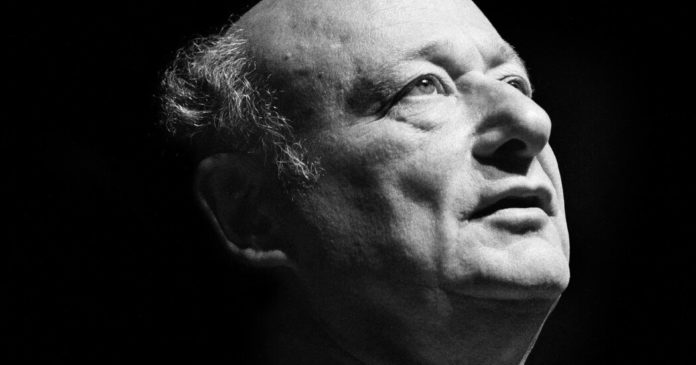
To the Editor:
Re “The Secrets Ed Koch Carried” (front page, May 8):
I read about former Mayor Ed Koch’s closeted state of mind with a mixture of anger and sadness.
As a gay psychiatrist who, in the 1980s, watched patients, friends and colleagues get sick and die from AIDS, I felt anger about the closeted mayor who refused to advocate forcefully enough for them.
Yet I also felt sadness as a psychoanalyst who has observed, studied and written about the psychology of being in the closet. I understand the suffering that such a state of mind entails. The psychological efforts, known as dissociation, of maintaining a compartmentalized state of mind often lead to errors in judgment.
Mr. Koch could have used his position to lead the fight against AIDS. However, the association in his mind, and in the mind of many others, that AIDS is primarily a gay disease (which it is not) resulted in his administration’s inadequate responses, with tragic results for many New Yorkers.
Jack Drescher
New York
The writer is a clinical professor of psychiatry at Columbia University and a past president of the Group for the Advancement of Psychiatry.
To the Editor:
To what purpose was this exposé? I am perplexed. This great public servant suffered in his own self-imposed “closet” because he chose his politically well-intentioned do-good life over public exposure of his sexual expression.
As a Jewish clergy person in New York City, I had been at occasions with him, and all he ever asked was, “How’m I doin’?” He asked because he truly worked hard for approval of his labors and really wanted to know!
This was the only Ed Koch it was important to understand. How sad that those times made this man hide who he was. One can only wonder how much more he could have accomplished had he not needed to suppress his true self. Well, in my mind, that gentleman will always be “Mr. New York.”
(Cantor) Richard Botton
Walnut Creek, Calif.
To the Editor:
Out of habit it’ll always be the 59th Street Bridge, not the Ed Koch Queensboro Bridge, to me — and to most New Yorkers born as late as, say, 1995. But for the future generations, perhaps they’ll go look up Ed Koch and see this asterisk next to his name and think, “Wow, imagine being too afraid to come out?”
Maybe the exercise will conjure compassion for a man who couldn’t let himself be everything he was meant to be because he was frightened to death of what it would mean.
Sometimes it’s impossible to hold two things at once, and in this case Mr. Koch deeply missed the mark as a gay man in power who didn’t do everything he could have during the AIDS crisis.
And yet, look at what he longed for most in the twilight of his life: a companion and chance to be fully realized as a gay man, albeit privately.
Let us not forget that everything is context before we go ahead with renaming the Ed Koch Bridge. There’s always an opportunity to learn something, but not if we erase it.
Jainee McCarroll
Brooklyn
To the Editor:
I grew up in New York City in the 1970s, and Ed Koch was the embodiment of the New York attitude and swagger of the era. But I was totally oblivious to how he struggled with his sexual identity and felt so isolated and alone.
I know that some have suggested that the article was disrespectful for revealing his sexual orientation that he worked so hard to hide. I felt that it was such a humanizing and graceful treatment of the man, and I am grateful that we know him a little better.
Len Davidson
Silver Spring, Md.
A Bill to Bar L.G.B.T.Q. Discrimination
To the Editor:
Re “Three Opinion Writers on Why the G.O.P. Can’t Stop Saying ‘Gay’” (The Argument, nytimes.com, April 27):
In more than 30 states, anti-L.G.B.T.Q. legislative efforts are underway — with some measures already enacted — to attack the rights of L.G.B.T.Q. Americans and stigmatize their lives — particularly the lives of those who identify as transgender.
The most alarming bills criminalize best practice health care for transgender youth endorsed by our country’s leading medical associations, ban classroom discussion of L.G.B.T.Q. people and bar transgender women from participating in school sports.
This onslaught of attacks makes enactment of federal nondiscrimination protections based on sexual orientation and gender identity — passed in the House and currently under consideration in the Senate — all the more urgent.
Culture wars cannot be won alone through affirmative laws protecting L.G.B.T.Q. Americans, but history teaches us that when the government musters up the political will to protect the rights of marginalized communities, it sends a loud and clear message, adding profound weight to the movement.
Elisa Crespo
New York
The writer is the executive director of the NEW Pride Agenda, an education and advocacy organization.
A Vote at Amazon Not to Unionize
To the Editor:
Re “Amazon Labor Union Loses Its Vote at a Second Warehouse on Staten Island” (Business, May 3):
I think this loss may actually be a good thing for the union movement. The last year or so has seen an upsurge in union activity and a giddy feeling that “Good Times Are Here Again” for unions.
When workers at a company like Amazon that treats its workers poorly decide that the lesser of two evils is to stay nonunion, perhaps the union movement will finally decide to deal with the structural issues that have led to its representing only about 10 percent of the work force.
When the union movement looks at why such a thing happened, don’t point fingers at others. Look in the mirror. You are the problem. Unions are not meeting the needs of today’s work force. Until that changes, unions will continue to be in trouble.
Bruce Higgins
San Diego
Young People Can Change
To the Editor:
Re “Don’t Stop Believing That People Can Change,” by Rebecca Solnit (Opinion guest essay, Sunday Review, April 24):
Ms. Solnit is right: We must lean into the possibility of transformation for one another.
This is particularly true for young people of color caught up in the criminal justice system, where they’re often treated as incapable of change and disposable — and mercilessly judged for what might be the worst thing they’ll ever do.
In New Jersey, as we fight to close youth prisons, we’re providing opportunities for youths who commit harm and those they harm to pursue healing, restoration and justice together.
This approach, which can be expanded across the state and the country, can change how we all think about justice, from something that is inflicted on the few to something that is participatory for the whole. Something that not only envisions transformation but is also fundamentally premised upon it. Something that recognizes that — as with all human beings — there are no throwaway kids.
After all, if we don’t believe and invest in the ability of our kids to transform, what hope is there?
Yannick Wood
Newark
The writer, a former New York City prosecutor, is the director of the Criminal Justice Reform Program at the New Jersey Institute for Social Justice.
To the Editor:
I loved the idea of all those unopened letters in “Their Hearts Were Opened. Letters, Not” (Arts pages, April 28).
Having recently found boxes of more than 500 letters tied into bundles that my mother had saved but that I never knew about, I related to how much this was an archive of people’s lives from decades ago.
Mine were all written in the 1940s to my mother from her friends, and her mother, but mostly from her soon-to-be husband, a Navy radioman stationed on a small tugboat off the coast of Normandy in World War II.
Their marriage didn’t last, but surprisingly all of these pretty revealing letters did. So I discovered how my parents lived as teenagers, and what they thought about then, and how very much in love they were once.
And that made all the difference.
Carrie Klein
Chapel Hill, N.C.








